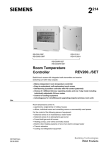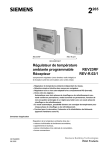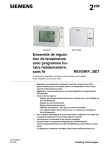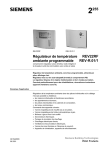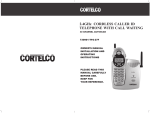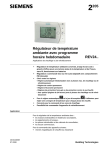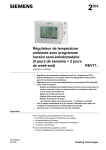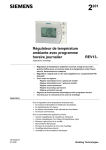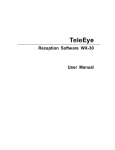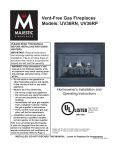Download Siemens REV23.03RF Technical data
Transcript
2 REV23.03RF 265 REV-R.03/1 REV23RF/SET Self-learning Room Temperature Controller Receiver REV23.03RF REV-R.03/1 Consisting of controller (with integrated radio transmitter) and receiver (switching unit with relay outputs) • • • • Mains-independent room temperature controller Straightforward, self-explanatory menu selection via roller selector Self-learning 2-position controller providing PID mode (patented) Choice of operating modes: Automatic with maximum 3 heating or cooling periods, continuously comfort, continuously economy, frost protection with one 24-hour operating mode including one heating or cooling period • In automatic mode, one temperature setpoint can be entered for each heating or cooling period • Optional control of cooling equipment • Advantageous for retrofitting and upgrading projects (wireless room unit) Use For control of the room temperature in: • Apartments, single-family or holiday houses • Offices, individual rooms, consulting rooms or commercially used spaces For control of the following pieces of equipment: • Solenoid valves of instantaneous water heaters CE1N2265en 22.02.2006 Building Technologies HVAC Products • • • • • • Solenoid valves of atmospheric gas burners Forced draft gas or oil burners Circulating pumps of heating systems, zone valves Electric direct heating systems or fans of electric storage heaters Thermal actuators Cooling and refrigeration equipment • • • • Radio signal transmission PID control with self-learning or selectable switching cycle 2-position control Automatic mode with 7-day switching program for 24-hour, working day, weekend or 7-day operation with up to 3 heating or cooling periods per day Each heating or cooling period has its own temperature setpoint One 24-hour operating mode with one heating or cooling period Override button Sensor calibration and reset function Frost protection or overtemperature protection Limitation of the minimum setpoint Holiday mode Heating or cooling mode Periodic pump run Optimum start control with the first heating period Functions • • • • • • • • • • Type summary Radio signal equipment consisting of: Room temperature controller (transmitter), receiver (switching unit) and support Room temperature controller (transmitter) and support Receiver (switching unit) REV23RF/SET REV23.03RF REV-R.03/1 Ordering When ordering, please give the type references according to «Type summary». The controller / transmitter REV23.03RF is supplied complete with batteries. Technical design Display and operating elements 2/17 Building Technologies HVAC Products Raumtemperaturregler REV23.03RF CE1N2265en 22.02.2006 Operating elements Selection of operating mode (see below) «Warmer» button «Colder» button Override button (see below) Roller selector for the menu, submenu and the settings Confirm by pressing Leaving the current menu level and returning to the menu level previously active (settings currently displayed will be accepted) Displays Time of day °C Room temperature Change batteries (display appears about 3 months before batteries are exhausted) Holiday mode active Selection of operating mode (only one operating mode active) Automatic mode Comfort mode Economy mode Frost protection or overtemperature protection 24-hour mode with one heating or cooling period (heating or cooling period is individually adjustable) Temporary change of the current setpoint temperature (change only active until the next switching point is reached) °C Press the + or – button once to display the adjusted temperature setpoint. It can be readjusted in increments of 0.2 °C (max. +/- 4 °C) Override button In operating modes and , this button can be used to manually switch from comfort to economy temperature, or vice versa. The selection is automatically reset when the next switching point is reached or when the operating mode is changed 3/17 Building Technologies HVAC Products Raumtemperaturregler REV23.03RF CE1N2265en 22.02.2006 Menu-driven user settings: 4 main menus are available Time of day and weekday Main menu Submenu h Settings Current time Current weekday Temperature Main menu T Time switch Main menu Default settings – heating / cooling Submenu Setpoint of comfort mode 19 °C 23 °C Setpoint of economy mode 16 °C 29 °C Setpoint frost or overtemperature protection 5 °C 35 °C Setpoint remote operation is not used with this unit (10 °C) (30 °C) Submenu Settings Selection of weekday, working day, weekend or week Selection of the number of heating or cooling periods (max. 3 periods per day) h Selection of the heating / cooling period’s start and end time T °C Selection of the heating / cooling period’s temperature setpoint Absence Main menu Submenu Entry of holidays or periods of absence. Number of days with economy mode setting / max. 99 days Temperature setpoint during absence. Default setting is 12 °C for heating and 30 °C for cooling 4/17 Building Technologies HVAC Products Raumtemperaturregler REV23.03RF CE1N2265en 22.02.2006 Menu-driven heating engineer settings Menu items CAL Settings Sensor calibration Setpoint limitation Optimum start control for the first heating period (in unit of time per 1 °C) 2-position control PID mode, self-learning PID mode, switching cycle 6 or 12 minutes / Periodic pump run off / on Heating / cooling mode Temperature setpoints In automatic operating modes, the temperature setpoints can be individually adjusted for every comfort period and for the continuous operating modes. The temperature setpoint of economy mode is the same in automatic and continuous operation. Protective function In frost or overtemperature protection mode, the room temperature is constantly monitored. If it falls (rises) below (above) the adjusted setpoint, control to the adjusted frost or overtemperature protection setpoint will be ensured. 24-hour operating mode The controller operates in 24-hour operating mode according an individually adjustable 24-hour program with 1 heating / cooling period. To adjust heating / cooling period, select 24-hour operating mode and adjust time program and desired temperature setpoint by roller selector. 24-hour operating mode is maintained until another operating mode is selected. Switching program The switching program can be used as a 7-day or 24-hour program, depending on programming. It is also possible to select one of the continuous operating modes with which the switching program is not used. With the 7-day program, all individual days, working days (1-5), weekend (6-7), or the entire week (1-7) can be programmed. For each heating / cooling period, 3 different switching patterns are available. There is a choice of 1, 2 or 3 heating / cooling periods. For each heating / cooling period, the start time, end time and comfort setpoint are to be entered. In between heating / cooling periods, it is always the same economy temperature setpoint that is used. This economy temperature setpoint can be adjusted on the temperature menu. 5/17 Building Technologies HVAC Products Raumtemperaturregler REV23.03RF CE1N2265en 22.02.2006 22 2261Z02 °C Example with 2 heating periods per day Heizphase 2 20 Heizphase 1 18 16 08 10 18 22 h Holiday function The holiday function is to be selected on the user menu. Set the start of the holiday / weekday), the duration of the holiday period and period (day of departure / the temperature setpoint ( ). This will enable the controller to maintain the adjusted temperature for a period of up to 99 days. Every day at midnight, the counter subtracts one day. When the holiday period is over, the counter reads 00, and the controller will automatically resume the operating mode selected last. Remote operation To be flexible, the REV23.03RF has no connection facility for remote operation. Factory settings Switching times Operating mode Block / weekdays Auto 1-5 Mo-Fr 6-7 Sa-Su Temperatures in ° C 1st period 1st period 2nd period 2nd period 3rd period 3rd period 06:00 08:00 11:00 13:00 17:00 22:00 19 23 20 23 21 23 16 29 07:00 23:00 19 23 1-7 Mo-Su 00:00 24:00 19 23 1-7 Mo-Su 00:00 24:00 1-7 Mo-Su 00:00 24:00 1-7 Mo-Su 07:00 23:00 16 29 5 35 19 23 Absence Factory settings Heating engineer level 16 29 12 30 Setpoint limitation Control mode 2-Point control Optimum start control OFF Periodic pump run OFF Heating active 6/17 Building Technologies HVAC Products Raumtemperaturregler REV23.03RF CE1N2265en 22.02.2006 Heating engineer level Access To access the heating engineer level, keep the «Warmer» and «Colder» buttons depressed and simultaneously roll the roller selector away from the display and then toward the display. Sensor calibration If the displayed temperature does not agree with the room temperature effectively measured, the temperature sensor can be recalibrated (recalibration to be made on the heating engineer level.) The displayed temperature can be matched to the effective room temperature in increments of 0.2 °C (max. ± 2 °C). Minimum setpoint limitation to 16 °C prevents undesired heat transfer to neighboring apartments in buildings with several heating zones. The setting is to be made on the heating engineer menu. CAL Setpoint limitation Optimum start control Optimization brings forward the switch-on point of the first heating period such that the adjusted setpoint will be reached at the required time. The setting depends on the type of controlled system, that is, on heat transmission (type of piping system, radiators), building dynamics (building mass, insulation), and heat output (boiler capacity, flow temperature). Optimum start control is switched off at Example using an actual room temperature of 18 °C and a setpoint of 20 °C T Pon °C 20 19 T TR x 1st heating period 2264D03 18 17 16 Start -3 h - 1½ h -2h -1h -1h - ½h (slow controlled system) - 1h -¾ h - ½h - ¼h (fast controlled system) 1/4h/°C Optimum start controll Off T t Control t - 4h 1/2h/°C - 2 h 1h/°C Temperature (°C) Forward shift of switch-on point (h) (medium controlled system) (no impact) TRx Pon Actual valve of room temperature Starting point of optimum start control REV23.03RF is a 2-position controller providing PID mode. The room temperature is controlled by the cyclic switching of an actuating device. The controller generates the positioning signals depending on the deviation of the setpoint from the actual value acquired by the built-in temperature sensor. The rate of response to the deviation depends on the selected control algorithm: Self-learning mode The controller is supplied with an active self-learning mode, enabling it to automatically adapt to the type of controlled system (building construction, type of radiators, size of the rooms, etc.). After a certain learning period, the controller optimizes its parameters and then operates with the parameters it has learned. PID 12 mode Switching cycle of 12 minutes for normal or slow controlled systems (massive building structures, large spaces, cast-iron radiators, oil burners). PID 6 mode Switching cycle of 6 minutes for fast controlled systems (light building structures, small spaces, plate radiators or convectors, gas burners). Pure 2-position control with a switching differential of 0.5 °C (±0.25 °C) for very difficult controlled systems with considerable outdoor temperature variations. For easy commissioning controller is set to 2-Point mode as factory setting. 2-Pt mode 7/17 Building Technologies HVAC Products Raumtemperaturregler REV23.03RF CE1N2265en 22.02.2006 Periodic pump run / Protects the pump against seizing during longer off periods. Periodic pump run is activated for one minute every 24 hours at midnight. This function can be selected on the heating engineer menu. Periodic pump run active: Operating mode Heating / cooling / / periodic pump run inactive: The controller is suited for cooling applications. The function can be selected on the heating engineer menu. The controller comes set for heating operation (refer to section «Factory settings»). User-defined data: Press the button behind the pin opening for at least one second: This resets the userspecific settings to their default values (heating engineer settings will not be changed). The clock starts at 12:00. During the reset time, all sections of the display are lit, enabling them to be checked. All user-defined data plus the heating engineer settings: Press the button behind the pin opening together with the warmer and colder buttons for at least one second. After the reset, all factory settings will be reloaded (also refer to section «Factory settings»). Mechanical design Controller Battery change The REV23.03RF has a plastic housing with a large display and easily accessible operating elements. The controller is removed from its base by sliding it upward. It is thus possible to replace the two type AA 1.5 V alkaline batteries contained in the compartment at the rear of the controller. About 3 months before the batteries are exhausted, battery symbol appears on the display, but all functions are fully maintained. When replacing the batteries, the current data will be retained for a maximum of one minute. Receiver REV-R.03/1 Plastic housing with easily accessible operating elements and removable cover. The unit can be fitted to all commercially available recessed conduit boxes or directly on the wall. A relay with a potential free changeover contact, the connection terminals and the receiving antenna are integrated in the housing. Base The base can be fitted to most types of commercially available recessed conduit boxes or directly on the wall. Support The support supplied with the controller enables the unit to be put on a shelf. It can be easily fitted to the controller with no need for tools. 8/17 Building Technologies HVAC Products Raumtemperaturregler REV23.03RF CE1N2265en 22.02.2006 Notes Planning controller / transmitter REV23.03RF • The room unit should be located in the main living room (on the wall or free-standing using the support provided) while giving consideration to the following points: • The distance to the receiver should not exceed 20 m or 2 floors • The unit should be located such that the sensor is able to capture the room temperature as accurately as possible, without getting affected by direct solar radiation or other heat or refrigeration sources (in the case of wall mounting, about 1.5 m above the floor) • The unit should be located such that it can transmit signals with as little interference as possible. For this reason, the following points should be observed: − Do not mount the unit on metal surfaces − Not in the vicinity of electrical cables and equipment such as PCs, TV sets, microwave appliances, etc. − Not in the vicinity of large metal structures or construction elements with fine metal meshes like special glass or special concrete • The control mode can be changed via the menu-driven heating engineer settings. • If the room temperature displayed does not agree with the room temperature effectively measured, the temperature sensor should be recalibrated (refer to «Calibration of sensors»). Wall mounting of controller / transmitter REV23.03RF • In the case of wall mounting, ensure that there is sufficient clearance for removing the controller from its base, and for replacing it First, fit the base. Then, engage the controller from the top. The base can be fitted to most commercially available recessed conduit boxes or directly on the wall 2261Z03 min. 10 cm Support of REV23.03RF • Refer to the Installation Instructions printed on the package. Planning Receiver REV-R.03/1 • The receiver and switching unit should preferably be mounted near the controlled device • The unit should be located such that it can receive signals with as little interference as possible. For this reason, the following points should be observed (same as with the transmitter): − Not in control panels − Not on metal surfaces − Not in the vicinity of electrical cables and equipment such as PCs, TV sets, microwave appliances, etc. − Not in the vicinity of large metal structures or construction elements with fine metal meshes like special glass or special concrete • The location where the unit is mounted should be dry and free from splash water • The unit can be fitted to most commercially available recessed conduit boxes or directly on the wall 9/17 Building Technologies HVAC Products Raumtemperaturregler REV23.03RF CE1N2265en 22.02.2006 Mounting and installation of receiver REV-R.03/1 The receiver must be wired with the power supply switched off. Mains voltage may be switched on again only after the unit is completely mounted. • When mounting the unit, the base must first be fitted and wired (L/N = AC 230 V mains supply, LX/L1 = consumers). Then, engage the unit at the top, swing it downward and secure it with a screw • For more detailed information, refer to the Installation Instructions supplied with the unit For the electrical installation, the local safety regulations must be complied with. Commissioning controller/transmitter REV23.03RF and receiver REV-R.03/1 LED_1 (green / red): Indication for - Signal strength - Receiver linked to cotroller/transmitter Override button and test telegram ESC button and learning telegram LED_2 (orange): Indication for - Learning mode - Telegram reception - Status of relais contact SET button RESET button 1. Switch on REV23.03RF • Remove the battery transit tab: As soon as the battery transit tab is removed, the unit starts to operate. 2. Mount REV-R.03/1 temporarily • If possible, mount receiver temporarily in a first run (e.g. double coated tape). Doing that, location of best RF reception can be identified later on. See clause “5 Find location of best reception“ Completely wire and mount REV-R.03/1 temporarily (please also close front cover) • 3. Link REV-R.03/1 with REV23.03RF a) Switch on power at REV-R.03/1: LED_1 lights always in red or flashes in red b) Press the "RESET“ button on REV-R.03/1 for about 4 seconds: The orange LED_2 will flash very fast and briefly (stored address of REV23.03RF will be erased) c) Press the "SET“ button (set / learn) for about 3 sec. until the orange LED_2 starts flashing slowly and continuously: Receiver is now in learning mode d) The receiver stays max. 25 minutes in learning mode. If no learning telegram from REV23.03RF is received during that period of time, repeat steps b) and c) again on REV23.03RF for about 4 seconds. Learning telee) Press the ESC button gram is transmitted f) If REV-R.03/1 receives learning telegram, the orange LED_2 flashes fast and briefly g) If the orange LED_2 is steady on, the relay is energized (= controlled device ON) h) If the orange LED_2 is dark, the relay is deenergized (= controlled device OFF) i) Depending on the operating state, REV23.03RF repeats the ON or OFF control telegram every 3 minutes. With this the relay will be switched ON or OFF according to control telegram latest after 3 minutes j) If REV-R.03/1 does not receive any correct control telegram within 60 minutes, controlled device is being switched off and LED_1 flashes in red k) In the event of a power failure at the REV-R.03/1, the relay will be deenergized. 10/17 Building Technologies HVAC Products Raumtemperaturregler REV23.03RF CE1N2265en 22.02.2006 4. Site REV23.03RF • • 5. Find location of best RF reception a) Switch off power at REV-R.03/1 Site REV23.03RF at preferred location for mounting at wall or setting up with stand Also refer to “Mounting and siting notes REV23.03RF and REV-R.03/1“ for b) Switch on REV23.03RF, site at preferred location and press override button about 4 seconds: REV23.03RF transmits test telegrams every 2 seconds. Transmission of test telegrams stops automatically after 10 minutes or after pressing either “ESC” button or override button c) Switch on power at REV-R.03/1 d) Observe both LEDs on REV-R.03/1 from a distance of 2…3 meters e) Orange LED_2 must flash briefly every 2 seconds. If LED_2 does not flash every 2 seconds, distance between REV23.03RF and REV-R.03/1 is too far. Mount REV-R.03/1 closer to REV23.03RF f) LED_1 shows received signal strength of last telegram: LED_1 flashes red: Signal is too weak to get a durable link. Mount REV-R.03/1 closer to REV23.03RF LED_1 flashes green: We distinguish between three signal strengths: Very good (flashes 3x), Good (flashes 2x) and Satisfactory (flashes 1x). As soon as LED_1 flashes in green, link between REV23.03RFand REV-R.03/1 is basically ok. g) Move REV-R.03/1 within an area of approximately 1 square meter to find location of best RF reception. Always observe LEDs from a distance of 2…3 meters. To get a durable link, we recommend to site REV-R.03/1 at a location where signal strength is at least “Good”. 6. Explanations to LEDs No REV23.03RF linked LED_1 lights always in red Red on LED_1 flashes in red Red on Red off Signal strength too weak Red off LED_1 flashes 3 times in green Green on Signal strength: Very good 1 2 3 1 2 3 Green off Starting sequence LED_1 flashes 2 times in green Signal strength: Good 1 2 1 2 Green on Green off Starting sequence LED_1 flashes 1 time in green Starting sequence Green on Starting sequence Starting sequence Signal strength: Satisfactory 1 1 1 Green off Starting sequence Starting sequence Starting sequence 11/17 Building Technologies HVAC Products Raumtemperaturregler REV23.03RF CE1N2265en 22.02.2006 LED_2 is always off Orange on Orange off LED_2 is always on Orange on Orange off Controlled device OFF Controlled device ON Learning mode active LED_2 flashes always Orange on Orange off LED_2 flashes briefly Reption of control telegram 7. Finishing mounting of REV-R.03/1 a) b) c) d) e) Switch off power Mark location where REV-R.03/1 is currently fixed If necessary loosen wiring Mount receiver at location marked before, wire completely and close housing Switch on mains power Notes • • In the event of a power failure at the REV-R.03/1, the relay will be deenergized. If in normal operation REV-R.03/1 does receive for more than 25 minutes a very weak or no control telegram from REV23.03RF, LED_1 starts to flash in red. If control telegram is still understood correctly, receiver continues with normal operation. If control telegram is not understood anymore, relay remains in last position being switched to before. As soon as REV-R.03/1 does receive any correct control telegram from REV23.03RF again, receiver continuous with normal operation In case of error, REV-R.03/1 switches off relay approximately 60 minutes after reception of last correct control telegram. The controlled device is also switched off and LED_1 flashes in red. As soon as REV-R.03/1 does receive any correct control telegram from REV23.03RF again, receiver continuous with normal operation • Commissioning controller/transmitter REV23RF (previous model) and receiver REV-R.03/1 • If instead of REV23.03RF the previous model REV23RF shall be linked with REV-R.03/1, follow the procedure below: − Follow steps 1 … 3b (same as commissioning with REV23.03RF) − Instead of step 3c, press buttons SET and RESET simultaneously for approximately 3 seconds until orange LED_2 starts flashing slowly and continuously: Receiver is now in learning mode for previous controller type REV23RF − Change temperature setpoints at REV23RF to force transmission of a control telegram: As soon as orange LED_2 flashes fast and shortly REV23RF and REV-R.03/1 are linked together − If the orange LED_2 is steady on, the relay is energized (= controlled device ON) − If the orange LED_2 is dark, the relay is deenergized (= controlled device OFF) − Continue to step 7 12/17 Building Technologies HVAC Products Raumtemperaturregler REV23.03RF CE1N2265en 22.02.2006 Technical data controller / transmitter REV23.03RF General data controller / transmitter Operating voltage Batteries (alkaline AA) Battery life Backup for battery change DC 3 V 2 x 1.5 V approx. 2 years max. 1 min General data controller Sensing element NTC Measuring range Time constant Setpoint setting ranges Normal temperature Economy temperature Frost protection setpoint Setting range Factory setting Resolutions of settings and display Setpoints Switching times Measurement of actual value Display of actual value Display of time SRD band Transmit frequency REV23.03RF Max. transmitter power Max. data throughput Modulation Frequency stability Address range (preset in the factory) Operation Climatic conditions Temperature Humidity Transport Climatic conditions Temperature Humidity Mechanical conditions conformity EMC directive R&TTE directive NTC 10 kΩ at 25 °C ±1 % 0…50 °C max. 10 min General data transmitter Environmental conditions Norms and standards Product safety Radio equipment Automatic electrical controls for household and similar use Electromagnetic compatibility Immunity Emissions Radio equipment Approvals In the following countries 5 … 29 °C 5 … 29 °C 5...29 °C 5 °C 0.2 °C 10 min 0.1 °C 0.2 °C 1 min 868.7 to 869.2 MHz 868.95 MHz < 10 mW / typically 4 mW 19200 symbol/s = 38400 Bit/s binary frequency changeover BFSK < ±20 ppm (±17 kHz) 16 Bit (0...65535) to IEC 60 721-3 class 3K3 5 ...+ 4 0 °C < 85 % r. h. to IEC 60 721-3 class 2K3 − 25...+70 °C < 93 % r. h. class 2M2 89/336/EEC EN 301 489-3 EN 301 489-3 EN 60 730-1 EN 61 000-6-1 EN 61 000-6-3 EN 300 220-3 0359 ! all ECC countries, Norway, Iceland and Switzerland 13/17 Building Technologies HVAC Products Raumtemperaturregler REV23.03RF CE1N2265en 22.02.2006 Devices of safety class Degree of pollution Weight (incl. package) II to EN 60 730-1 normal REV23.03RF REV23RF/SET Color Housing Base Dimensions 0.37 kg 0.68 kg signal-white RAL 9003 grey RAL 7038 140x103x30 mm Technical data receiver REV-R.03/1 Operating voltage Power Frequency Switching capacity of relays Voltage Current Environmental conditions Operation Climatic conditions Temperature Humidity Storage and transport Climatic conditions Temperature Humidity Mechanical conditions conformity Norms and EMC directives standards Low-voltage directives R&TTE directives Product safety Radio equipment Automatic electrical controls for household and similar use Special requirements placed on energy controllers Electromagnetic compatibility Immunity Emissions Radio equipment Approval In the following countries General unit data Devices of safety class Degree of pollution Weight (incl. package) REV-R.03/1 REV23RF/SET Color Unit front Base Dimensions AC 230 V +10/−15 % < 10 VA 45...65 Hz AC 24...250 V 6 (2.5) A to IEC 60 721-3 class 3K3 0...+45 °C < 85 % r. h. to IEC 60 721-3 class 2K3 − 25...+70 °C < 93 % r. h. class 2M2 89/336/EEC 73/23/EEC EN 301 489-3 EN 301 489-3 EN 60 730-1 EN 60 730-2-11 EN 61 000-6-1 EN 61 000-6-3 EN 300 220-3 0359 ! all ECC countries, Norway, Iceland and Switzerland II to EN 60 730-1 normal 0.24 kg 0.68 kg Signal-white RAL 9003 grey RAL 7038 83x104x32 mm 14/17 Building Technologies HVAC Products Raumtemperaturregler REV23.03RF CE1N2265en 22.02.2006 Connection diagram receiver REV-R.03/1 Lx L Lx N L1 L2 N2 L N Lx L1 AC 24...250 V AC 230 V L L2 M1 N2 Y1 2255A01 Nx Live conductor, AC 230 V Neutral conductor, AC 230 V Live, AC 24...250 V N.O. contact, AC 24...250 V / 6 (2.5) A N.C. contact, AC 24...250 V / 6 (2.5) A Circulating pump Receiver REV-R.03/1 Actuating device M1 Y1 N Nx Application examples T T N2 F1 F2 N1 N1 N2 F2 F1 T T Y2 M1 T M1 2255S02 2255S01 Y2 T Instantaneous hot water heater N1 T N3 Atmospheric gas burner T N2 Y4 E1 Zone valve T N1 2255S05 Y3 2255S03 N4 N2 Cooling equipment 15/17 Building Technologies HVAC Products Raumtemperaturregler REV23.03RF CE1N2265en 22.02.2006 N1 T N2 Y1 2252S04 M1 Circulating pump with precontrol by manual mixing valve E1 F1 F2 M1 N1 N2 N3 N4 Y1 Y2 Y3 Y4 Cooling unit Thermal reset limit thermostat Safety limit thermostat Circulating pump Room temperature controller (transmitter) REV23.03RF Receiver REV-R.03/1 Room temperature controller (transmitter) REV23.03RF Receiver REV-R.03/1 3-port valve with manual adjustment Solenoiod valve Motorized 3-port valve Motorized 2-port valve 16/17 Building Technologies HVAC Products Raumtemperaturregler REV23.03RF CE1N2265en 22.02.2006 Dimensions 30 Controller / transmitter REV23.03RF 2265M03 140 104.5 127 12 78.8 56 Ø6 0 11.75 83.50 Receiver REV-R.03/1 84 2265M01 32 2265M02 60 104 60 ©2006 Siemens Switzerland Ltd. Building Technologies HVAC Products Raumtemperaturregler REV23.03RF Subject to alteration 17/17 CE1N2265en 22.02.2006

















